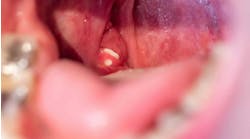While attending the recent RDH Under One Roof conference in Las Vegas, I listened to Anne Guignon and Kristine Hodsdon refer to "corporate dentistry" — dealers and manufacturers who keep you outfitted with hundreds of dental products. The titles of their courses were, respectively, "Falling in love with dental hygiene all over again," and "We need to become smart mouths: Hygiene essentials for presenting dentistry." So, yes, the references to corporate dentistry were minor points at best.
But the remarks by Kristine and Anne prompted me to think about hygienists' relationship with corporate dentistry. RDH magazine happens to host RDH Under One Roof (the next one, by the way, is July 25-26 in Chicago; my publisher will do somersaults when he notices that I slipped that information into this space). Besides dental hygienists, RDH Under One Roof hosts an assortment of exhibitors. Exhibitors belong to that strange cult known as corporate dentistry (at least the ones who were not a dental professional in a former life).
The members of the cult don't daydream about being on the center stage of the profession they serve. A couple of guys refueling airplanes may experience a lingering wish to be pilots. A guy who sells tennis shoes may have wanted to be a professional basketball player. As far as I know, the members of the cult of corporate dentistry never pleasurably entertain the thought of closely examining someone else's teeth. Even though you don't share the same fantasies about careers, you do have their admiration. In fact, corporate dentistry is quite motivated by the dedication shown by dental professionals.
Somehow, the relationship between dental professionals and corporate dentistry reminds me of a book I recently read about "thru-hiking" on the Appalachian Trail (a rather long hiking trail that stretches from Georgia to Maine). "Thru-hikers" do the whole trail at one time, walking the distance in five to seven months. For obvious reasons, you want to pack as lightly as possible. I can envision dentists balking at a camping store's suggestion to carry a bulky, eight-pound cot for 2,160 miles. Actually, a better analogy is that manufacturers of camping equipment now produce very cutting-edge, lightweight items that can easily be carried all the way to Maine (or Georgia, if you're southbound). But the problem is that dentists don't want to purchase anything because this new stuff wasn't around back during their training in Boy Scouts. Hygienists, on the other hand, would just say, "I'm not allowed to buy anything. I'm sorry about wandering into your store. I suppose I have everything I need for the Appalachian Trail in my purse."
My interpretation of what Anne and Kristine — among other dental hygiene leaders — are saying is, "You need to be more visible to dental manufacturers. You. Not just the leaders of the ADHA or public speakers. You."
You are not in the wrong place when you stand before a booth at a dental conference. You belong. If you are curious about any aspect of your profession, you are always welcomed. If you answer the question "What do you do for a living?" with "I'm a dental hygienist," exhibitors roll out the carpet for you. If you are 4 years old or 16 years old, and your dental office makes you think, "I want to be a dental hygienist when I grow up," you belong. The energy behind what you've already accomplished — and the promise of what's to come — has a very far-reaching impact on the corporate ladders of dental manufacturing and distribution. After her lecture, Anne told me, "What I've seen is that manufacturers are getting very jazzed up about dental hygiene."
Understand, though, that the manufacturer's rep is looking for clues, based on first impressions, about the overall value of conversing with you. You belong. The conversation doesn't have to be about "buying" something. Talk about a shortcut you use with their product. They're always interested in your innovations. Talk about comments patients make about their products. Manufacturers gobble that kind of feedback up.
Members of the corporate dental cult can share information with you too. Manufacturers painstakingly gather information about the segments of dentistry relevant to their product lines. Sure, you have to sort through the manufacturer's information and determine what's relevant to you and what's not. Is that chore of sifting through information really that hard to do? I hope not. The skills of communication are a dental hygienist's strong suit. Simply put, you're the expert and you belong.
Mark Hartley is the editor of RDH. He can be contacted at [email protected].





